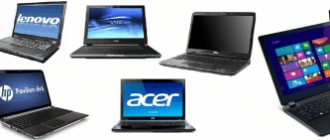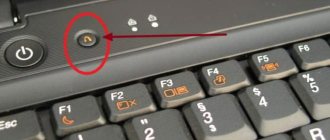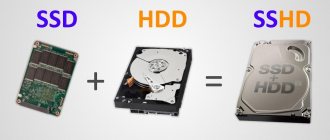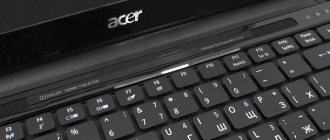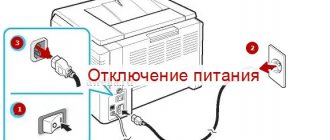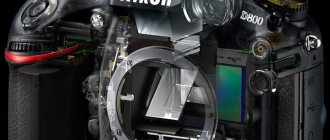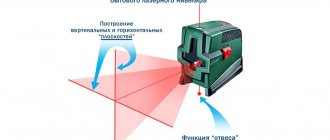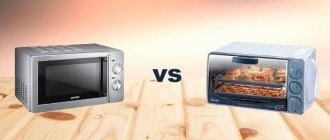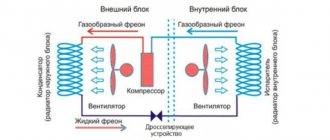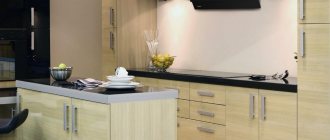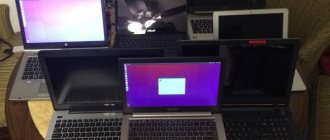Portability
The visible difference between a netbook and a laptop is its significantly smaller display size, body thickness, and weight. If the diagonal of a standard laptop can reach 20 inches and fully replace a monitor, for example, an all-in-one, then for a netbook this parameter is 12 inches maximum. This makes the device lighter and more compact. However, the small screen will not allow you to enjoy a detailed image, so watching movies, playing games and working with spreadsheets on it is not very convenient.
Modern models have such a thin body that the netbook fits into any bag or even pocket. This feature is good for travelers, because the netbook is convenient to use in cafes, transport and other places. It was created for those who need to quickly type a message, read an article, or view files, even in extreme situations.
Interesting read: How to choose a netbook
What is the difference between a netbook and a laptop? Characteristics, features and what to choose
Today we will find out what is called a netbook, what types of devices exist, what their operating principle is, and also how a gadget differs from a traditional laptop
WHAT IS THE DIFFERENCE OF A NETBOOK FROM A LAPTOP. CHARACTERISTICS, FEATURES AND WHAT TO CHOOSE
Good afternoon, today we will learn what is called an ultra compact electronic
device or
netbook
,
what types of
devices
exist
,
what
their
operating principle
is, and also
how a gadget differs
from
a traditional laptop
.
In addition, we will tell you how to choose the right device
based on
personal preferences
,
optimal parameters
and at
an affordable price
, as well as
what
you need
to pay attention to before buying
a device in the first place.
In conclusion, let's talk about what basic functionality
modern
netbooks
and
laptops
should have , as well as
what
can be
attributed
to
the advantages
and
disadvantages
of these
electronic
devices.
Modern technologies
in the field of
computer technology
they are constantly developing and do not stand still, which contributes to
the creation of compact
, yet quite
productive electronic devices
.
Today it is impossible to imagine our life
without a computer large
devices like
stationary
devices with
a monitor
for their
high performance
, while others prefer to use
portable full-size laptops
for their
moderate compactness
and
optimal functionality
.
However, in addition to the classic types of computers
, there is another option, which is
an ultra compact
and
ultra portable
device.
This option is a netbook
, which is
an electronic
device with
dimensions
between
a laptop
and
a tablet
.
HOW TO CHOOSE A LAPTOP, FEATURES AND CHARACTERISTICS
WHAT IS A MONO BLOCK. FEATURES AND HOW TO CHOOSE
Even despite the fact that quite recently the market has been massively
Tablets
with
smartphones
“
entered
” , and with
large screen diagonals
,
the segment of ultra-compact computers
or
netbooks
almost did not shrink and the devices
did not stop selling
.
Today, on the shelves of computer stores
you can find
netbooks
of various
configurations
and
cost
much
less than ordinary laptops
, and therefore quite often buyers who are
poorly versed
in
technology
have
the question
: “
Is it necessary to overpay for a gadget
?”
In our article we will try to answer
this
question
, and also
compare netbooks
with
laptops
to
find out
which
device
will be
better suited
for
solving
certain
tasks
.
1. Features of laptop computers. Differences between a netbook and a laptop
Main feature
modern
laptops
, and as we know,
a laptop
belongs specifically to this
group
of devices - their
portability
and
functionality
, however, it is different for each
type of equipment
.
Today, on the market of computer devices
or, as they say,
laptops
there are
3 most common types of equipment
,
the classification
of which
is based
on their
dimensions
and
display diagonal
.
Classification of portable computer equipment:
– Laptop
: is
a portable personal computer
with
a display diagonal from 13 to 18 inches
;
Technical characteristics or “iron filling”
When choosing a personal PC, size matters, but not as much as the technical parameters of the devices. The latest generation of laptops from famous brands also boasts an ultra-thin and mobile design. What is the difference between laptop and netbook hardware:
- Processor power . Portable personal computers are designed taking into account the fact that the device is intended not for full-time work, but for additional work. Therefore, developers are more focused on reducing the size than equipping the gadget with modern technologies. Often, the netbook lineup has an Intel Atom processor, which is one of the weakest on the market. The advantage of such equipment is low energy consumption, but the disadvantage is the inability to work with heavy programs.
Some compact laptops from the Apple, Lenovo and Asus brands also run on more powerful hardware - Core m3 and i3, but they are more expensive.
- Video card . The graphic capabilities of a netbook are limited, since the devices have a low-quality controller. Applications and games of the new type will not run on low-budget devices, and on more expensive devices the work will not be as fast and stable as on gaming laptops. Netbooks are not suitable for gamers and graphic designers, photographers and editors who work with complex programs.
- Hard drive size . Portable laptops have much smaller hard drive capacity and are not as fast. SSD drives in netbooks are less than 700 GB, while standard personal PCs can have up to 4 TB. This disk capacity is needed for those who work with a large number of files, download various programs, and watch a lot of audio and video content. To supplement office work or use the device for communicating on social networks, 200 GB, which are available in each netbook, is enough.
- Amount of RAM . RAM on modern laptop models, for example, Asus and Dell, reaches 4 GB, which is enough for work. Netbooks do not replace a computer and do not fill the need for powerful hardware. Designed for fast communication, they are more like a functional tablet with a keyboard. Therefore, if you need to work with a large number of files and programs open at the same time, then it is better to choose the largest volume of OP. For normal use without special loads, you can get by with 2 GB of RAM.
Performance of netbooks and laptops
Just as a laptop is smaller in size than a desktop computer, a netbook is smaller in size compared to a laptop. Productivity is approximately in the same proportions.
The CPU or now the APU (APU=CPU computing units + GPU graphics adapter) is responsible for performance, as all mobile processors are equipped with. We will compare them.
The APU marking (take for example Intel Core i7-3520M) for full-fledged laptops has the Latin letter “M” at the end of the model name. Thanks to this, you can immediately determine whether the APU belongs to the mobile class - mobiles or laptops.
These processors are now being built into mobile devices with a diagonal of 12.5″. The maximum power (consumption) of such models is around 35 W. It turns out that the concept of a laptop extends to display diagonals up to 12.5″.
There are less powerful APUs with a "U" at the end of the model name. For example Intel Core i7-3517U. If you look closely at the specifications, it will become clear that this is the same processor (in comparison with the Intel Core i7-3520M), but in the case of “U” it has reduced operating frequencies. The main processor frequency has been reduced from 2.9 to 1.9 GHz. and the frequency of integrated (built-in) video from 650 to 350 MHz. The rest is all the same. Even the price. Due to this, APUs for netbooks or ultrabooks with the letter “U” are more economical. This Intel Core i7-3517U model consumes only 17 W. Most likely, the name Ultrabooks comes from the marking of processors with the letter “U”.
The same situation applies to Intel Core I3 and i5 processors. An APU from the mobile segment marked “M” is taken, and the frequencies are reduced. It is marked “U” and sent to netbooks or ultrabooks. This is great, because although the performance is reduced, it is still much higher than in an entry-level APU or CPU. For example, Intel Atom or AMD E. Due to this, a significant increase in the battery life of netbooks and ultrabooks is obtained.
Thanks to this article, the situation regarding the performance differences between laptops and netbooks has become a little clearer to me. Yes, and ultrabooks too. If someone has a different point of view, let's discuss in the comments.
PS
When choosing processors for your mobile device, be it a netbook, ultrabook or laptop, it seems to me advisable to give preference to models with the letters “U”. They have enough performance, even for less demanding tasks, and in addition to this, you will have a longer battery life.
PS 2
It turns out that the difference in performance between a netbook and a laptop is minimal and a netbook can just as successfully perform all the tasks of a full-fledged laptop, only a little longer
Laptop and netbook keyboard
The larger the device, the larger the display and keys. Regular laptops have a functional keyboard similar to that of a desktop device, and models with a display larger than 20 inches are also equipped with special gaming keys.
As for netbooks, due to the small size of the case, the keyboard is incomplete and lacks some “hot keys”, additional numeric layout and device control buttons. The keys themselves are small and there is no space between them for convenient printing of large texts. If an office worker is faced with the choice between a laptop or a netbook, then the latter gadget is inferior to the former.
The difference between a netbook and a laptop
Dimensions
One of the most understandable differences between a laptop and a netbook is the size of these gadgets. Regardless of the fact that individual laptops today can easily fit in a handbag, their usual size is still considered to be a diagonal of 15.4 inches, while the diagonal of thin netbooks is no more than 12 inches.
Of course, their small dimensions easily make them very compact, but on the other hand, this brings certain inconveniences.
For example, on a small display it is not very convenient to watch movies or use the built-in keyboard. The latter makes typing on modern netbooks somewhat difficult. In addition, due to limited keyboard space, netbooks do not have various function buttons.
"Iron"
When choosing the optimal small computer, size, of course, plays a very important role. But they are not as important as technical parameters.
The design of modern netbooks means that they will simply be an addition to a PC, and not some kind of full-fledged unit. Therefore, they are equipped not with powerful, but with compact components. This makes it possible to maintain their small dimensions.
The difference between a laptop and a netbook regarding technical characteristics is as follows:
- Main processor . Many netbooks are equipped with a processor called Intel Atom. It is considered one of the most low-power. This kind of filling makes the gadget inexpensive, but actually deprives it of any ability to work with heavy applications. At the same time, some laptops are equipped with a fairly powerful main processor such as an Intel Core i5 or i7, which allows the user to work with almost any program and play any game. But such models today are very expensive.
- RAM . The vast majority of laptops have RAM up to 4 GB. This is quite enough for simple viewing of videos, working with games and various programs. In addition, the volume can be easily increased even up to 32 GB if necessary. Netbooks, unfortunately, cannot boast of a large amount of RAM. The vast majority of models have no more than 2 GB.
- Video card . The small computer comes with a not very powerful controller. That's why netbooks have rather limited graphics capabilities. Many applications and games will not be able to launch. Therefore, for all those who often work with various complex applications or play computer games, it is best to purchase a laptop with an expensive, powerful video card.
- Hard drive capacity . On some laptops, the hard drive capacity can reach as much as 4 TB. It is difficult to find a gadget on the market today with 700 GB of internal memory.
Autonomy
The low power of netbooks provides a fairly long battery life, which today can even reach eight to ten hours. The diagonal of the display plays a big role in this, since it is the matrix of the device that acts as the main consumer of electricity.
The autonomy of the laptop is now within two to five hours. Therefore, in this case it is simply impossible to go on the road without a power supply. In laptops, the charge is spent on the video card and processor, their full cooling, as well as the backlight of the large screen.
Software
Small computers are equipped with OS variations that will definitely not overload the main processor, and will also provide the ability to perform all the necessary options. They often run Linux OS for these devices with low technical parameters.
You can also install a special version of Windows OS. True, there is some risk that the device will work somewhat slower.
Laptops can run almost any operating system with full support for the necessary capabilities. Thus, on a new laptop you can easily install the OS that the user is used to seeing on his home computer.
Keyboard
The larger the device, the larger its display and buttons. Laptops generally have a so-called function keyboard, very similar to that of a regular PC, and models with a screen over 20 inches are also equipped with special gaming buttons.
If we talk about a netbook, then due to their small dimensions, there is an incomplete keyboard; there are no separate hot keys, as well as buttons for controlling the device. The buttons there are quite compact and there is no distance between them for comfortable printing of fairly large texts. If an office worker has a choice between a laptop or a netbook, then the latter device is inferior to the former.
Power
Among other things, the difference between netbooks and laptops is their overall power, which is interconnected with the purpose of these electrical devices.
A netbook is a gadget for simple office work. Its graphics system is very limited, so for most of today's computer games, unfortunately, such devices are simply not suitable. Laptops are often not inferior to conventional PCs in terms of overall functionality.
Functionality
Another interesting difference is the overall functionality. The devices have different fillings inside. The processors in laptops are much more powerful than those in any netbooks. However, they consume significantly more electrical energy, so they can operate for less time without recharging. Laptops can operate for about three hours without special recharging, and netbooks can operate for much longer. In addition, modern netbooks often do not have a dedicated optical drive, which laptops often have.
Difference between laptop and netbook software
The technical parameters of netbooks are weaker, so standard operating systems and programs are not suitable for their full operation. For smooth and productive use of the device, it is installed by default with Linux OS, which “weighs” less and is more optimized for low-power PCs.
The disadvantage of the system is the complexity of its operation, as well as the limited application market. For newer netbook models, a specially stripped-down Windows OS is installed. There is no such problem in laptops - you can install any user-friendly software system on them and it will work properly.
Which is better: netbook or laptop?
For full-time work in one place (home or office), as well as for movie nights and games, laptops are more suitable. They have more powerful technical specifications, larger display diagonals, and better graphics adapters, controllers and video cards. Even if the model is low-budget, over time it is improved and more modern “filling” is installed. The battery capacity is enough to complete work processes in the event of a sudden voltage failure and loss of power supply, and the device is used from the mains.
Netbooks have gained popularity not because of their hardware, but because of their small size. The small, slim body weighing up to 1.5 kg is convenient to carry with you everywhere in a bag, briefcase or large pocket. It is indispensable during an urgent trip somewhere, traveling and a device for communication outside the home. The netbook is convenient to use in places without electrical coverage, because the battery charge lasts up to 10 hours of intensive work. The disadvantage of such a PC is that even if desired, it cannot be improved (the case cannot be disassembled, the parts are soldered in). Users will not be pleased with the lack of an optical drive for viewing files on disks and fewer USB ports.
Which is better - a laptop or a netbook? Expert advice
Which is better - a laptop or a netbook? There is no definite answer to this question, because it depends only on what you expect to get from your newly acquired equipment. And in order to understand which is better – a laptop or a netbook – you should know the advantages and disadvantages of each type of device.
Pros and cons of laptops
One of the most important advantages of a laptop is its large screen.
If you like to play various computer games or are a movie buff, you won’t find a better option. In terms of work, laptops are also quite convenient, because they allow you to work with a large number of windows simultaneously. In addition, modern laptops are almost as powerful as desktop PCs. This means you can use your favorite programs and applications without any problems. There will be no difficulties with their loading and performance.
In addition to this, laptops are usually equipped with large hard drives - from 400 GB and above. This memory is enough to store all important documents, games, movies, music.
As for the disadvantages (and they should also be considered when choosing which is better: a laptop or a netbook), the first thing to note here is some inconvenience when carrying it. The minimum weight of a laptop is 2 kg. And this is not to mention the fact that the dimensions of such equipment are also quite large. Another disadvantage is the device’s short battery life. If you know that your equipment will accompany you at various meetings, conferences and on trips where there is no way to recharge it, it is better to immediately buy a more powerful battery or opt for a compact netbook.
Pros and cons of netbooks
Netbooks (or, as they are also called, ultrabooks) are a relatively young type of computer technology that is gaining popularity every year.
First of all, netbooks attract people with their lightness and compactness - they can easily fit even in a small women's handbag. In addition, one cannot fail to mention the duration of their battery life. On average, it ranges from 4 to 10 hours (depending on the manufacturer and model), which significantly exceeds similar indicators even for the most sophisticated laptops. If you are wondering what is better - a laptop or a netbook - and at the same time you are used to living in constant motion, your choice should definitely fall towards the second option. And, of course, the cost of netbooks is pleasantly pleasing - as a rule, it is significantly lower than the prices of desktop PCs and even laptops.
Among the disadvantages, first of all, it is worth mentioning the low power of such devices. The capacity of the hard drive also suffers: only in rare cases does it exceed the 160 GB mark. In addition, netbooks are equipped with a miniature keyboard, which is not always convenient for working with large amounts of text information.
Conclusion
So which is better - a netbook or a laptop? It all depends on what you need a computer for: if we are talking exclusively about working with documents (text, spreadsheets, etc.) and Internet surfing, then, of course, a netbook wins. For those who prioritize high power, the ability to watch movies in HD quality and play games, a laptop would be the optimal choice.
In order not to overpay for unnecessary characteristics, be sure to take into account the optimal parameters of each type of computer.
| Laptop | Netbook |
| Dual core processor 2 GHz | RAM – from 2 GB |
| RAM – 3 GB | Bluetooth, Wi-Fi |
| Monitor – 15” | Hard drive – 250 GB |
| Hard drive – 320-500 GB | Preferably on Intel Atom N450 |
I hope this article helped you understand all the benefits that a laptop or netbook has. What's better? But you must find the answer to this question yourself!
